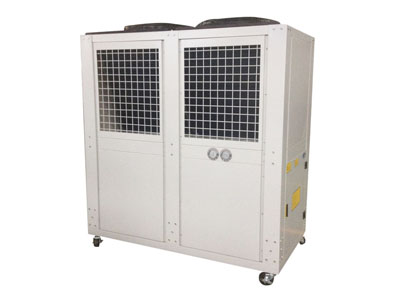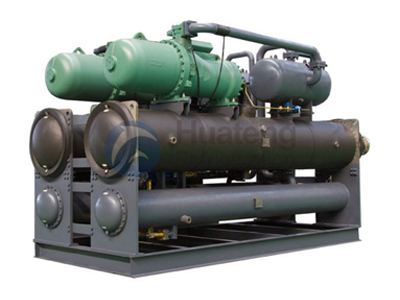Difference Between Chiller And Cooling Tower
While it is possible to use chillers and cooling towers in the same industry, it is important to pair the correct equipment with your specific industry if you want to maximise efficiency and reduce costs. Uses and applications for chillers include
Refrigeration applications
Plastics industry applications
Breweries and small scale breweries
Metal finishing and water jet cutting applications
As for cooling towers, these cooling systems are typically used in the following applications.

Air Cooled Scroll Chiller
Power plants close to rivers and lakes
Large mechanical processes that will generate large amounts of heat
Thermal power stations
Oil and gas refineries
The higher efficiency of cooling towers makes them more suitable for large-scale applications where large amounts of cooling are required. Cooling towers are often used in any industrial plant where a continuous flow of cooling water is required. Chillers are used for smaller applications that are not directly affected by additional heat emissions.
How chillers and cooling towers work together?
Whichever type of cooling tower or chiller you wish to use, one of the best aspects of these systems is that they are available in a wide range of different sizes. So it is actually possible to use a smaller chiller in combination with a smaller cooling tower. If you are using one of these systems for a smaller application or piece of equipment, you can pair a water-cooled or air-cooled chiller with a portable cooling tower directly on the roof of an industrial building. However, it is also possible to use a larger chiller in combination with a cooling tower, which is usually done using a water-cooled chiller.

Water Cooled Screw Chiller
If you want to use these systems in a small brewery or power plant, combining a large chiller with a large cooling tower can achieve efficient cooling. If you have the budget required for the upfront cost of both systems, then you should be able to save a lot of money in the future. If you are using these systems in a power plant, you can create a central cooling facility by placing water-cooled chillers on the lowest floor of the building or air-cooled chillers on the roof. Cooling towers should always be installed on the roof to ensure that the heat is properly distributed in the air.
Find out which chiller and cooling tower is right for your business
When choosing a chiller or cooling tower for your food processing plant or power plant, it is important to understand the difference between chillers and cooling towers if you want to choose the right system for your application. If your distillery requires an industrial chiller, you won't need a large naturally ventilated cooling tower because you don't need a constant flow of chilled water throughout the distillery. The type of system you choose depends on factors such as your access to water, the amount of cooling required, your budget and the space you have available.
As mentioned earlier, it is actually possible to use chillers and cooling towers together to improve cooling efficiency. The decision you make depends entirely on your cooling needs. If energy efficiency is important to your company, then it is well known that chillers are usually less efficient than cooling towers. With this information in mind, you can make an informed decision.
To learn more about the differences between coolers and cooling towers or to enquire about the water sensors and equipment we offer here, please contact us.
Refrigeration applications
Plastics industry applications
Breweries and small scale breweries
Metal finishing and water jet cutting applications
As for cooling towers, these cooling systems are typically used in the following applications.

Air Cooled Scroll Chiller
Power plants close to rivers and lakes
Large mechanical processes that will generate large amounts of heat
Thermal power stations
Oil and gas refineries
The higher efficiency of cooling towers makes them more suitable for large-scale applications where large amounts of cooling are required. Cooling towers are often used in any industrial plant where a continuous flow of cooling water is required. Chillers are used for smaller applications that are not directly affected by additional heat emissions.
How chillers and cooling towers work together?
Whichever type of cooling tower or chiller you wish to use, one of the best aspects of these systems is that they are available in a wide range of different sizes. So it is actually possible to use a smaller chiller in combination with a smaller cooling tower. If you are using one of these systems for a smaller application or piece of equipment, you can pair a water-cooled or air-cooled chiller with a portable cooling tower directly on the roof of an industrial building. However, it is also possible to use a larger chiller in combination with a cooling tower, which is usually done using a water-cooled chiller.

Water Cooled Screw Chiller
If you want to use these systems in a small brewery or power plant, combining a large chiller with a large cooling tower can achieve efficient cooling. If you have the budget required for the upfront cost of both systems, then you should be able to save a lot of money in the future. If you are using these systems in a power plant, you can create a central cooling facility by placing water-cooled chillers on the lowest floor of the building or air-cooled chillers on the roof. Cooling towers should always be installed on the roof to ensure that the heat is properly distributed in the air.
Find out which chiller and cooling tower is right for your business
When choosing a chiller or cooling tower for your food processing plant or power plant, it is important to understand the difference between chillers and cooling towers if you want to choose the right system for your application. If your distillery requires an industrial chiller, you won't need a large naturally ventilated cooling tower because you don't need a constant flow of chilled water throughout the distillery. The type of system you choose depends on factors such as your access to water, the amount of cooling required, your budget and the space you have available.
As mentioned earlier, it is actually possible to use chillers and cooling towers together to improve cooling efficiency. The decision you make depends entirely on your cooling needs. If energy efficiency is important to your company, then it is well known that chillers are usually less efficient than cooling towers. With this information in mind, you can make an informed decision.
To learn more about the differences between coolers and cooling towers or to enquire about the water sensors and equipment we offer here, please contact us.
评论
发表评论